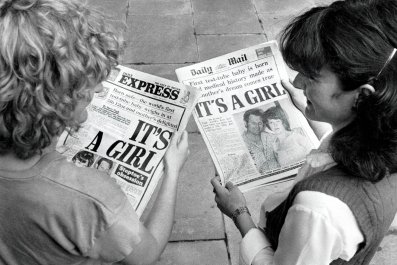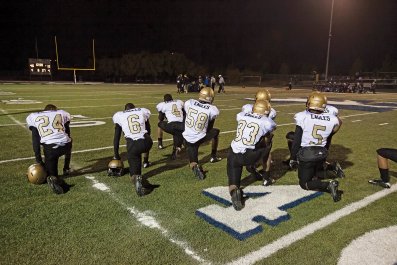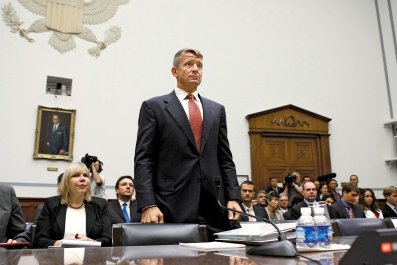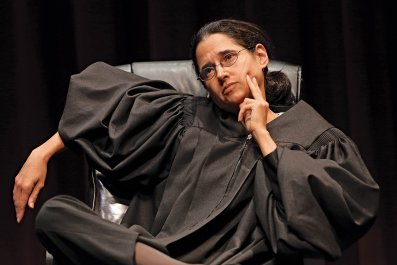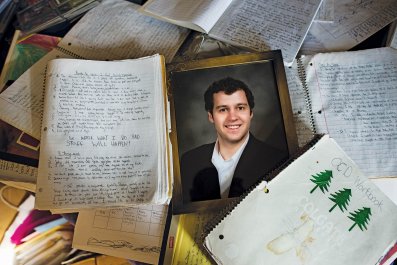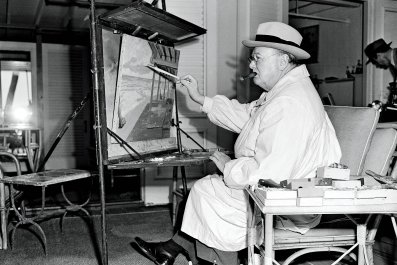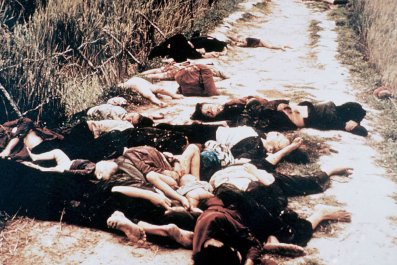Milnsbridge, a suburb of Huddersfield in the Colne Valley. In the 6pm gloom there's a sense of compressed, Gothic Northernness: a black canal, a towering railway viaduct, the lowering south Pennine hills. I am standing in an empty street of terraced houses, opposite what looks like a permanently closed working men's club. But I'm early for my appointment, so I walk around the corner, for a cod-and-chip supper that costs £4 – less than half the price I'd pay in London, where I live as a Northerner in exile.
An hour later, the door of the club is propped open, light spills out. Thirty people are inside, being served drinks, mainly a Yorkshire Real Ale called Black Sheep. "Pours like mother's milk," the barman assures me. It has the bustling cosiness I associate with my father's working men's club in York, but with a higher moral tone, lent by pamphlets on the iniquity of fracking, photographs of Edwardian suffragettes.
The former Milnsbridge Socialist Club was revived last year as The Red and Green Club, co-operative venture. A prime mover in this was professor Paul Salveson, a 62-year-old former Labour councillor and an advocate of the Northern working class traditions of mutuality and self-help, which he has applied to the endangered railway branch lines of Britain. Salveson, who began his career as a train guard based at Blackburn, founded the community rail movement that has saved many British branch lines from closure by involving local communities in their operation.
This bottom-up approach he contrasts with centrist, statist top-down approach that has long since captured the Labour Party, and which he encapsulates as: "We'll sort it out for you." To Salveson's mind, this has not "sorted out" the problems of the North, which have only grown as power has been concentrated in London since the second world war.
Salveson is therefore considering standing in the general election as a parliamentary candidate for Yorkshire First, a new Northern devolutionist party that wants three of four elected assemblies across the North – bodies with "real power" as part of an "England of the regions". This public meeting has been called to test levels of support for a candidacy.
Yorkshire First was formed just before the European elections of this May by two Yorkshire businessmen, Richard Carter and Stewart Arnold. Arnold stood as a candidate in those elections, tempted by the fact the European constituency of Yorkshire and the Humber is the nearest administrative unit to the "historic" Yorkshire that was blurred by the Local Government Act of 1972. Arnold received 19,000 votes; only 1.5%, yes, but that's a higher percentage than Ukip or the Greens achieved in their own first electoral outings; he spent precisely £604.36 on his campaign, and the constituency included North Lincolnshire, whose populace were unlikely to tick a box marked Yorkshire First.
Richard Carter also urges me to bear in mind that those elections took place "Before devolution became fashionable!" That is, before the Scottish referendum that so unnerved the Westminster establishment, and prompted David Cameron to promise a new constitutional settlement for England.
But Carter does not really believe that devolution for the North is a fad. In Britain, it has manifestly worked. Scotland, Wales and Northern Ireland all have faster growing economies than the north of England; they have stronger cultural identities, and get more of Westminster's attention. Add in the antipathy to Westminster that has fuelled the rise of Ukip, and you have a climate very different to that of 2004, when the North-East voted a decisive "no" to John Prescott's offer of regional assembly.
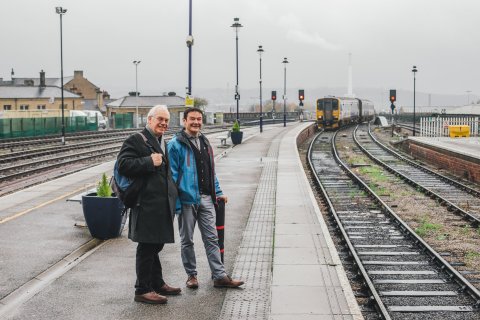
Yorkshire First is one of a number of Northern devolutionist groups formed recently. It has friendly relations with Campaign for the North, founded by Harold Elletson, former Tory MP for Blackpool turned Liberal Democrat, whose romantic vision is for a self-governing region to be called Northumbria, after the kingdom ruled a thousand years ago by the no-nonsense Viking, Eric Bloodaxe. There is also the North East Party, set up this year by a former Labour MP, Hilton Dawson. All three seek a more profound shift of powers from London than is offered by the scheme of devolution that is actually under way. This is known as Devo Met, the granting of a greater financial independence – on a case-by-case basis – to the new combined authorities, such as Greater Manchester or West Yorkshire.
This plan has more or less cross-party support in Westminster, but is disliked by the council leaders of smaller Northern towns left outside these authorities. Last week, leaders of 119 English local authorities signed a letter that demanded a further shift of power from London.
Devo-Met is being pushed hard by George Osborne, who, in a speech in June, talked up the "agglomeration effects" of the big cities. The showcase, and test-bed, for Devo-Met is Greater Manchester Combined Authority. Its Labour councillors have gone along with Osborne's imposition of mayor (even though Manchester voted "No" to the idea of a mayor a couple of years ago) in return for new powers over transport, planning, housing and skills.
Devo-Met would not be happening in Manchester if Osborne did not sense a genuine threat – if not to the coherence of the nation, then to some marginals in the North. But for most of those in the Red and Green Club, Devo-Met is a Westminster "stitch-up", a patronising attempt to create mini-Londons complete with mini-Borises. The belief is that no genuine counterweight to London can come from London.
A young woman at the meeting – a student at Huddersfield University – says that all the best internships are in the capital. The migration of young people to the south is an issue for even the most successful Northern towns, and has all but killed some others. On the train to Huddersfield I mentioned it to a resident of the town, a man in his 70s. "There's that," he says, "and what about the migration from here [Huddersfield] to Leeds every morning? It's like the sardine packer's outing."
Yorkshire First argues that Devo-Met will boost the very places that don't need boosting – and at the expense of their neighbours. Shortly before the meeting, Salveson says to me: "Is it beech trees that kill anything nearby? Leeds is like a beech tree." He urged me to visit such overshadowed spots as Dewsbury or Batley if I didn't believe him.
As the meeting progressed, I felt myself becoming increasingly indignant on behalf of my native county, especially at the news that "historic" Yorkshire contains three of the ten poorest regions in Northern Europe. Perhaps I'm not entitled to this indignation, having moved to London, and benefited from its property boom. But, while the price of my house has gone up, my cultural capital has declined.
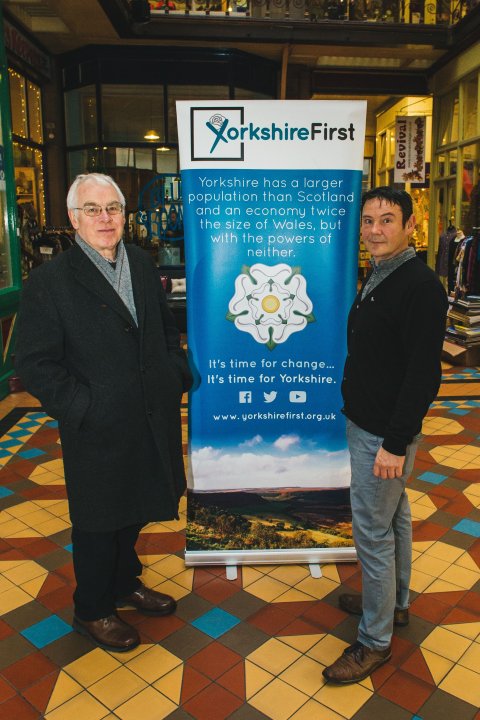
I was born in York in 1962, when the North was booming, and disposable incomes were rising rapidly. The Beatles were on the launch pad, and their curious accents were entrancing the South. Northern literature was also to the fore, although – a slight complication, this – the heroes of books like Saturday Night, Sunday Morning by Alan Sillitoe or Billy Liar by Keith Waterhouse, were fighting traditional Northern identities rather than embracing them. After leaving university I hoped, in my writing, to emulate the likes of J B Priestley, the Bennetts (Arnold or Alan), Melvyn Bragg, Victoria Wood. But the bottom has dropped out of the Professional Northerner market. In a globalised world, the North has lost its cachet. I have written many novels set in Yorkshire, but my biggest seller has been a history of the London Underground. The North has lost its cachet along with its economic significance, and when they hear the word Yorkshire, many people think of blustery and over-opinionated Yorkshiremen.
Richard Carter calls this "the Geoff Boycott problem", and in the Red and Green club, a woman says she worries Yorkshire First is too male – also that it romanticises Yorkshire. She was bothered by the website photograph of a dry-stone wall, which does look like an image from one of those coffee table books of Yorkshire Views. (They have "views" in the North, and "scenery" in the South). Carter responded that the iconography of the party was up for grabs, and that about a third of those who have taken "the Yorkshire pledge" are women. (At the moment, YF has pledgers – running at about a hundred a month – rather than members).
Another objection was raised. The name Yorkshire First accidentally echoes that of the far-right Britain First, which is particularly unfortunate given that Yorkshire First is progressive and pro-European. Salveson, whose surname is Norwegian, has a neat line here: "Yorkshire was founded by migrants!" (Danish Vikings).
In spite of these reservations, a show of hands indicates strong support for a candidacy. Paul Salveson will contest Colne Valley – a three-way marginal with a Tory incumbent – for Yorkshire First, which hopes that another twenty or so candidates will be announced soon.
The next morning, I travelled to Wakefield on one of the ancient, bus-like Pacer diesel trains that bedevil the Northern Rail network. A mile outside Wakefield, the thing coughed to a halt. After about five minutes, the guard spoke up, "Please note," he said wearily, "this is a timetabled pause." Rail improvements are certainly under way in the North, especially around the Manchester "superhub", but infrastructure investment is dwarfed by that in London. The North, you might say, has been paused for decades. Salveson promises to "upset the applecart" with his candidacy, and he believes he has an outside chance of winning. If a Yorkshireman resident in London is allowed an opinion here, then I think that would be no bad thing.




